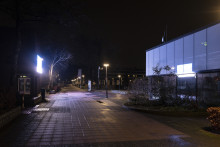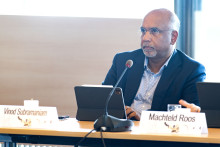Recently, UT lecturer Kishore Sivakumar was harassed and racially abused on campus. He barely managed to dodge a blow. This was not the case for postdoc Jack Jiao, who was still working at EEMCS department of Mathematics of Operations Research at the time. While he was walking back home, he was racially abused and attacked by a group of young people. This happened near the Sports Center, on the same evening that Sivakumar was attacked.
Dismissal
Jiao, injured in his leg, face and nose, travelled back to China for medical treatment after the incident. A CT scan showed that he had several bone fractures in his nose. Because of the attack and the fear for his personal safety, Jiao decided to stop his postdoc at the UT and sent in his resignation letter.
A number of young people have now been identified thanks to camera images and consultation between UT security and the local police officer. That group now has a campus ban. ‘Since then, there have been no more incidents from this group – fortunately’, says integral safety manager Erwin Medendorp.
Fear
Unlike Sivakumar, Jiao did report the incident to the police. According to Jiao's supervisor, statistics professor Johannes Schmidt-Hieber, the police did not act appropriately. 'What makes me angry is that the police didn't take any action at the time. While his nose was bleeding, Jack was asked to write down what had happened. And they also said that there were no cameras at the site of the attack, so they couldn't do anything with it. They could at least have called an ambulance or offered help in some other way.'
Moreover, according to Schmidt-Hieber, it also feels like too little is being done to tackle the perpetrators. 'I had understood from security that three people have been identified and are no longer welcome on campus. But that will hardly solve the problem and take away the fear I experience within my research group. I lead an international group of twenty people and several cases have been reported. I am also aware of other cases where expats were targeted.'
Pelted with eggs
Schmidt-Hieber also points to a post in the Facebook group ‘Enschede Expats’ from this summer in which someone says she was pelted with eggs by two boys on fatbikes and chased by them. She immediately reported it to campus security. Also, two PhD candidates from the statistics group with Chinese roots were pelted with eggs this summer, according to Schmidt-Hieber.
Something similar happened to an Engineering Doctorate candidate of Turkish origin. She was pelted with eggs a few days earlier, near the barriers at the new Es parking lot, also by two individuals. She reported the incident to the police, to no avail. 'I had only been in the Netherlands for five weeks and under the assumption that this was a safe country. You come here as an expat hoping to make a career and contribute something. Such an attack especially affects you mentally.' The EngD candidate decided to move from campus to Twekkelerveld after the incident. She still has feelings of unsafety. 'I try to forget about it. But it always feels like I have to look over my shoulder. I just want to be able to feel safe.'
'Terrible and unacceptable'
Integral safety manager Medendorp calls the cases of violence and feelings of insecurity 'terrible'. People who would think they were safe in their working and living environment and then being harassed is unacceptable. In the incidents of last summer we could not immediately identify perpetrators, but fortunately we can now.'
He points out that the UT campus is not a closed bubble. 'We have an open campus and as a university we are not immune to social developments. It is difficult to determine whether racist motives played a role. But the current social trend – the coarsening and groups being driven apart – is also reflected in these incidents. And this also feeds the feeling that the violence is only aimed at people from abroad.'
What lies within the UT's sphere of influence? 'In principle, we can support the report and the investigation,' says Medendorp. 'The police are responsible for tracking down perpetrators. And that, unfortunately, takes time. Based on images alone, it is not possible to simply find out the name or details of perpetrators. That can be very frustrating. After a report, we consult with security and the local police officer. That is why it is so important that people report an incident immediately. The sooner someone calls our emergency number (053 489 2222, ed.) and reports it to the police, the greater the chance that we can catch or identify perpetrators – whether or not in the act.'
Aftercare
The issue is now also in the crosshairs of the university council, which has an unsolicited advice to the Executive Board on campus violence. They will discuss the issue on Wednesday morning. In the meantime, Medendorp insists on the importance of supporting victims. 'You don't want anyone to have an experience like that, which is why aftercare is so important. Even if it is only the question of how things are going or how someone has slept. What people from outside our community do, we can do little about. But we can do something about how we behave towards each other.'
The integral safety manager hopes that there will be no further incidents. 'Although such a campus ban is not sacred, unfortunately. After last summer's incidents, it was quiet for months, until the eruptions last month. But the overarching







